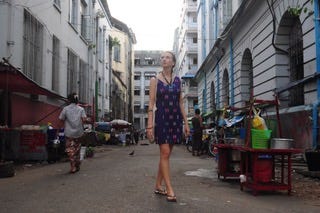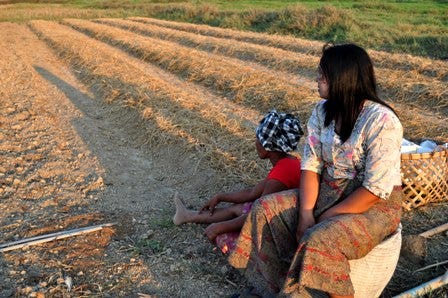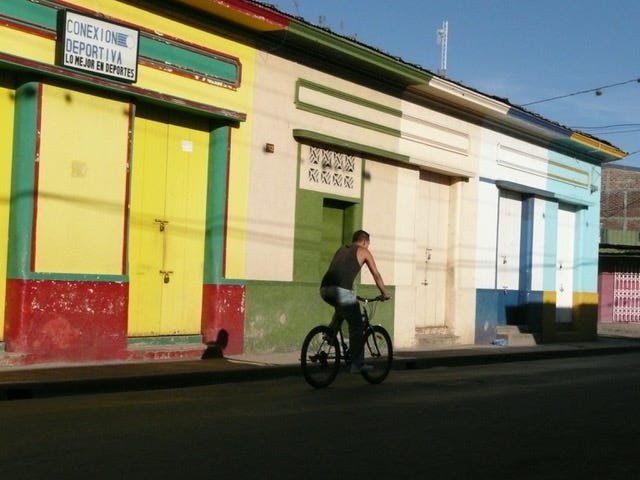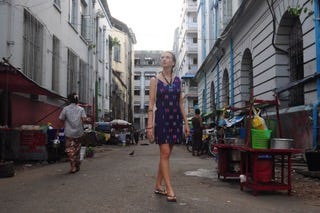Welcome back to Career Compass on The Navigation: a monthly series exploring other women’s musings, meanderings and methods for navigating life, with a focus on their career paths. Through short interviews with millennial women, we’re exploring linear and non-linear career paths, how they approach work to make it work for them, and the blurred lines between hobbies and hustles.
💻🧭
Our guest for November is
, a Scot, who grew up in Glasgow, and has gone on to have a self-described “very non-linear journey into an international career.” Having lived and worked in over ten countries, Catriona’s experiences span the globe, and in this interview she shares insights into what took her to destinations a world-away from her hometown, and the realities of living and working in such locations.I connected with Catriona earlier this year through a community thread held by
, from which the idea of this interview blossomed. In the interim I have enjoyed diving into her writing through . Sharing stories and insights as someone who has been on many outward journeys, as well as those of “inner landscapes”, Catriona’s writing is a beautiful and honest insight into the realm of the international aid sector in particular, but her reflections often offer something more all-encompassing for readers to ponder.Having studied and, though relatively briefly in comparison, worked in the international development and aid space, I find Catriona’s experiences both inspiring and confronting, encouraging us to think and reflect on the parts we play and the impact we can have on making the world a better place.
I hope you will enjoy reading some of those insights here.
Thank you Catriona for being a guest on The Navigation!
Could we start off with you sharing some musings on working in the aid sector?
With 20 years of experience, carving out expertise in gender policy and land governance, living and working in 10 countries, I’m sure you’ve had to deal with a wide variety of surprises and challenges, funding changes and policy trends.
What does it mean to you to be working in the aid sector now, and has it been all you’d imagined when you first ventured onto this career path?
This career has been different than I imagined – although I am also not sure I imagined it, because I didn’t know it was a career option when I was younger. In the late ‘90s and early ’00s, when I was at secondary school/university, there weren’t many sources of information about international aid work. I had only been on a couple of holidays abroad by the age of 20 – so my worldview was very Scottish and I didn’t know much about work outside of Scotland.
Living a long time in places like Nicaragua or Myanmar drastically changed any preconceptions I had about both the work and the world. I ended up knowing both in more complex terms.
Now, almost 20 years later, I would describe my feelings about the sector as ambiguous. I see the work as complicated and I see my own experience in the sector as complicated. I do think it was a privilege to have the opportunity to know the world - but I also feel it came at a cost.
On a professional level, like many aid workers, I struggle with the limited impact of aid interventions and the power dynamics at play. It is difficult to see tangible results and emotionally heavy to watch people go through injustice or hardship, realising there is very little you can do to change that. I also often questioned whether I should be the one influencing an agenda of change in the countries I was working in (more power dynamics).
On a personal level, alongside adventures and interesting cultural experiences, I navigated a lot of instability, isolation, sickness and traumatic experiences. In recent years I feel a lot of anger about the unsafe situations I found myself in as a young adult. I wouldn’t want that on another young woman. I still haven’t reconciled all of that.
In sharing this, part of me wants to try to offer a more enthusiastic reflection – but if living in all these places has taught me anything, it is ambiguity. It is hard to unpick the good from the bad – they are entwined. I feel I am still on a journey to reconcile these experiences.
Thank you for being so open with your thoughts on this - and I’d personally rather the honesty than unrealistic enthusiasm. I have several friends working in and around the aid sector, having both studied international development as part of my degree, and worked at a consultancy focusing on aid projects, and I think the complexities around limited impact and power dynamics are factors that most struggle to deal with.
Could you tell us more about your meanderings through this career thus far? What led you to working in aid? What took you, from Glasgow, to such an array of countries? And more recently, how have you come to be sharing more your words, indeed your meanderings, on Substack?
I initially left Glasgow to study Scots Law with French because I felt out of place at home. I went to uni in Edinburgh and while on a study abroad year in France, I made friends who encouraged me think about pursuing my interest in human rights.
During that year, and after my degree finished, I started to write letters to organisations in Europe asking for jobs. I wrote hundreds of letters which eventually led to a paid internship in the European Court in Luxembourg, which led to other jobs in Luxembourg, evening and weekend volunteering and, two years later, getting a job as a junior staff member in the Luxembourg Government Aid Agency, which sent me to rural Nicaragua for two years.
For the years after that, I moved country for short-term contracts. I also moved for a relationship which didn’t work out. Once I was in my thirties, I lived almost eight years in Myanmar, then for about four years back in Scotland, before moving to Dubai for my current role, where I have been for a couple of years.
Throughout this time, I have always written, and I love going back to read my old journals. One of my motivations for starting a Substack was to explore more of the complexities around travel, aid and going after your dreams. For me, Substack is the next step in this bigger journey. I want to usefully share my experiences with others and to bridge the personal and professional – because while I am an expert in women’s rights issues, I am also a woman who has navigated abuses in her own life. It is difficult to talk about these experiences in professional spaces, so I wanted to create a space where I could have these conversations.
I feel I am just getting started…
It’s so interesting to learn more about how you got started on this journey, and to consider how the people we meet in our personal lives, or those who give us a chance professionally, can really alter the path we are on in life. I can definitely resonate.
And the idea behind your Substack is exactly what this platform is about really - you have something so meaningful and purposeful to share, experiences that only you can tell in this way. I’ve been enjoying getting to learn more about your world through your essays this year.
You’ve write a lot about journeys, both geographical and those of our inner lives, and have mentioned that you would like your stories to offer a ‘navigation toolkit’ for others. Could you offer any particular methods or guidance for readers, fellow millennials or otherwise, who are navigating particularly complex journeys, whether in their careers, creative lives, or elsewhere?
My experience of journeys is that feeling lost is a key part of that process. I think learning the skills to be comfortable in ‘lostness’ is key. Lost means you are entering new territory, new landscapes or going beyond the familiar and the comfortable. I also think learning the discernment to know when to explore and when to seek safety is an important skill. Pushing our boundaries isn’t always the way to go.
Things which connect me to my own navigation system are creative projects, yoga, meditation, running, therapy, nature, writing, community/friendship, hiking, cycling and sometimes going out and having fun. I think we need to find the next steps that feel authentic and aligned for us. There is so much advice out there – but only we know what the right way for ourselves.
In my case, some journeys have helped provide me with tools, skills or insights to navigate difficult experiences. But I don’t think crossing a border is a prerequisite for an experience of self-discovery and change. I see it more that different countries offered contexts which helped me locate new qualities inside myself. I had to do the inner work to integrate them and bring them home.
What a wonderful way to put it. I think we often underestimate the importance of inner work - which often is the most crucial part.
And on a related but perhaps more practical note, for those who may be interested in working, or even volunteering, internationally themselves, do you have any guidance for getting into the aid sector?
I would describe my way into the sector as a mix of luck, amassing skills, lots of volunteering and persistence. As I mentioned above, I volunteered alongside my first jobs and I also taught myself Spanish. By the time I got my first paid opportunity in the sector, I had a law degree, spoke 3 languages, had worked in legal research for 2 years and had volunteered in my spare time for about 4 years.
My recommendation – keep building your skillset, find other ways to earn money and try to find ways to gain experience alongside or in your day job. Language skills can be a bonus for international work and having a relevant degree or experience in the sector is also helpful.
I would also recommend researching the sector. There are so many opportunities and job types. Not every role means moving to a remote part of a foreign country.
Read stories from myself and others, listen to podcasts, follow people on LinkedIn, find a mentor.
Understand colonialism and capitalism - the aid sector is part of both those systems – not separate from them.
I mentor on this She Changes Climate scheme and really want to help other young women find their way.
It sounds strange – because I don’t think anyone working in law or medicine would say this – but I would suggest you explore your motivations for wanting to work in aid. I say that because the sector is often romanticised. But you might end up working far from home, in an isolated or dangerous environment, earning less than you would have on another career path.
Are you the sort of person who will enjoy that? Are you ok without all your home comforts? Do you have resources and a support system to fall back on? What are your boundaries like? What about your ability to advocate for yourself? How will you cope living in a very different culture? Will you still be happy doing this work when you realise that the project you are working on can’t save the world or even a tiny corner of it?
Of course, sometimes the only way we have answers to these things is by trying them. I would never talk anyone out of an experience.
Alternate questions might be – will you be satisfied if you don’t go on the big adventure/test your limits? Are you someone who needs to try hard things and wants to see the world up close?
We can never be prepared for life. But we can be equipped and informed about our choices.
What a powerful response, thank you Catriona! I think it’s really key you’ve highlighted that the sector is part of both the structures of colonialism and capitalism, and understanding this, and the parts we play within it whether as volunteers or salaried employees, is really crucial to having any kind of meaningful part to play.
As we wrap up, do you have anything you’ve read/watched/listened to lately that you’d like to recommend for readers, à la the Cultural Compass column on ?
📕 A book that really supported me early on in my career and which I often go back to is The Poisonwood Bible by Barbara Kingsolver – excellent reading for understanding the complex negotiations you are faced with in aid work.
📗 For navigating journeys, I would recommend Women Who Run With the Wolves by Dr Clarissa Pinkola Estes. She has been a valuable teacher in understanding my journey and my life.
📘 To read about Nicaragua, I recommend The Country Under My Skin by Gioconda Belli. Her poems are also great.
📙 To read about Myanmar, I recommend A Heartless Forest: An Anthology of Burmese Women Writers. Or, for a Western take, Everything is Broken by Emma Larkin.
Thank you so much Catriona, for sharing insights into your journey, and how twists and turns in your career, and life, have interwoven. It’s been really interesting for me to learn from your experience working in the aid sector - and hopefully for readers of The Navigation too!
If you liked this piece and are keen to show some support without a paid subscription, a Ko-fi coffee is always appreciated. ☕








Lovely interview, anyone looking to work in aid/development sector will benefit from reading it.
I enjoyed reading this, thank you. I've worked abroad as a volunteer teacher but never through an aid organisation. Aid seems to me to be such a complex and convoluted thing. As I think you touch on in the interview, our motivations as young people are likely to be at least partly about wanting adventures for ourselves, which, as you say, can lead to a lot of complexity...